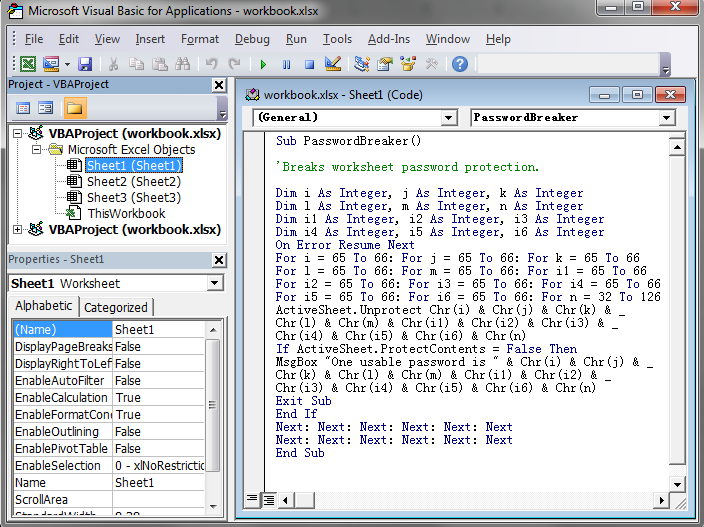Unprotect Excel Sheets Easily: Quick Guide

Unlocking the full potential of Microsoft Excel often involves dealing with protected sheets, which can sometimes hinder productivity. Whether you're a project manager looking to modify an inherited spreadsheet or an accountant needing to update financial data, knowing how to unprotect Excel sheets can save you a lot of time and frustration. Here's a comprehensive guide on how you can easily unprotect Excel sheets, ensuring you can continue working efficiently.
Understanding Excel Protection

Before we delve into the methods of unprotecting sheets, it’s essential to understand why Excel sheets are often protected:
- To Prevent Unintended Modifications: Protecting a worksheet can prevent accidental changes to formulas, data, or formatting which could lead to inaccuracies or data corruption.
- Security Measures: Locking sheets can also act as a basic security measure to protect sensitive or confidential information from unauthorized viewing or editing.
- Data Integrity: It helps in maintaining the integrity of data by preventing accidental deletions or edits, particularly in shared work environments.
Image showcasing a typical protected Excel sheet:
Methods to Unprotect Excel Sheets

Let’s explore several methods to unprotect Excel sheets:
Using Password

If you know the password, unprotecting a sheet is straightforward:
- Go to the ‘Review’ tab on the Ribbon.
- Click on ‘Unprotect Sheet’ or ‘Unprotect Workbook’ if the entire workbook is protected.
- Enter the password when prompted, and click ‘OK’.
Using VBA Code

If you’re comfortable with coding, VBA provides a way to unlock sheets:
- Press Alt + F11 to open the VBA editor.
- Insert a new module by selecting ‘Insert’ > ‘Module’.
- Copy and paste the following code:
- Replace “YourPasswordHere” with the actual password.
- Run the macro by pressing F5 or selecting ‘Run’ > ‘Run Sub/UserForm’.
Sub UnprotectSheet()
Dim ws As Worksheet
For Each ws In ThisWorkbook.Worksheets
If ws.ProtectContents = True Then
ws.Unprotect Password:=“YourPasswordHere”
End If
Next ws
End Sub
Third-Party Tools

When all else fails, third-party tools can be a lifesaver:
- Software like PassFab for Excel, Excel Password Recovery, or VBA Password Bypasser can remove or retrieve lost passwords.
- Be cautious when using these tools, as they might not be officially endorsed by Microsoft.
Precautions and Best Practices

When unprotecting Excel sheets, consider the following:
- Always backup your Excel file before attempting to unprotect sheets to avoid data loss.
- Ensure you have legal permission to unprotect the sheet, especially if it’s not your personal document.
- Avoid using third-party tools unless absolutely necessary due to potential security risks.
- If you’ve forgotten the password, try recovering it from the creator or a file recovery service rather than cracking it.
Why You Might Need to Unprotect Sheets

Here are some reasons why unprotecting Excel sheets might be necessary:
- Collaboration: To allow team members to edit or update data.
- Updates: To make necessary changes to formulas, formats, or data entries.
- Data Recovery: If you’ve forgotten the password and need access to critical information.
🔐 Note: Unprotecting sheets without permission can be an ethical and legal issue. Always ensure you're legally and ethically allowed to do so.
Final Thoughts

In the world of Excel, the ability to unprotect sheets is more than just a technical skill; it’s about ensuring efficient workflow and maintaining control over data. Whether you’re using a password, VBA, or third-party software, always prioritize security and ethical considerations. Remember, unprotecting sheets should be done with the intent to enhance productivity, not to breach privacy or security protocols. This guide has provided you with various methods to achieve this, from simple password entry to more advanced VBA techniques, ensuring you can handle most protection scenarios you’ll encounter in Excel.
Can I unprotect an Excel sheet without a password?

+
Yes, you can use VBA code or third-party tools to unprotect sheets without knowing the password, but it should be done ethically and legally.
Is it safe to use third-party tools?

+
While some tools can be effective, they carry risks like potential malware infection or breaching software licensing agreements. Use reputable software cautiously.
What should I do if I’ve forgotten the password?

+
Attempt to recover it from the creator, use password recovery services, or consider legitimate tools that help retrieve or remove forgotten passwords.



